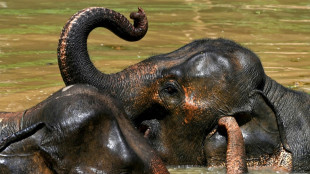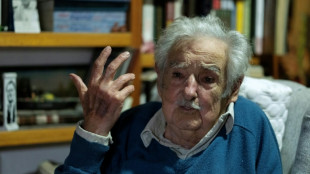
-
 Icelanders head to the polls after government collapse
Icelanders head to the polls after government collapse
-
England strike twice to have New Zealand in trouble in first Test

-
 Researchers analyse DNA from dung to save Laos elephants
Researchers analyse DNA from dung to save Laos elephants
-
North Korea's Kim, Russian minister agree to boost military ties

-
 Brook's 171 gives England commanding 151-run lead over New Zealand
Brook's 171 gives England commanding 151-run lead over New Zealand
-
Kamala's coda: What's next for defeated US VP Harris?

-
 Chiefs hold off Raiders to clinch NFL playoff berth
Chiefs hold off Raiders to clinch NFL playoff berth
-
Australia's Hazlewood out of 2nd India Test

-
 Trudeau in Florida to meet Trump as tariff threats loom
Trudeau in Florida to meet Trump as tariff threats loom
-
Jihadists, allies breach Syria's second city in lightning assault

-
 Trudeau in Florida to meet Trump as tariff threats loom: media
Trudeau in Florida to meet Trump as tariff threats loom: media
-
Hunter shines as Hawks top Cavs again

-
 Southampton denied shock Brighton win by dubious VAR call
Southampton denied shock Brighton win by dubious VAR call
-
Alarm over high rate of HIV infections among young women, girls

-
 Swiss unveil Euro 2025 mascot Maddli
Swiss unveil Euro 2025 mascot Maddli
-
Bears fire coach Eberflus after latest agonizing NFL defeat

-
 Rallies mark one month since Spain's catastrophic floods
Rallies mark one month since Spain's catastrophic floods
-
Arnault family's Paris FC takeover completed

-
 Georgian police stage new crackdown on pro-EU protestors
Georgian police stage new crackdown on pro-EU protestors
-
'We're messing up:' Uruguay icon Mujica on strongman rule in Latin America

-
 Liverpool dealt Konate injury blow
Liverpool dealt Konate injury blow
-
Van Nistelrooy appointed Leicester manager

-
 Verstappen brought back to earth in Doha after F1 title party
Verstappen brought back to earth in Doha after F1 title party
-
Global wine output to hit lowest level since 1961

-
 Norris boosts McLaren title hopes with sprint pole
Norris boosts McLaren title hopes with sprint pole
-
Big-hitting Stubbs takes satisfaction from grinding out Test century

-
 Romania recounts presidential ballots as parliamentary vote looms
Romania recounts presidential ballots as parliamentary vote looms
-
French skipper Dalin leads as Vendee Globe passes Cape of Good Hope

-
 Chelsea not in Premier League title race, says Maresca
Chelsea not in Premier League title race, says Maresca
-
Brazil's Bolsonaro aims to ride Trump wave back to office: WSJ

-
 France requests transfer of death row convict held in Indonesia: minister
France requests transfer of death row convict held in Indonesia: minister
-
'Mamie Charge': Migrants find safe haven in Frenchwoman's garage

-
 Iconic Uruguayan ex-leader hails country's swing left as 'farewell gift'
Iconic Uruguayan ex-leader hails country's swing left as 'farewell gift'
-
Thousands rally in Georgia after violent police crackdown on pro-EU protesters

-
 Shared experiences make Murray 'perfect coach', says Djokovic
Shared experiences make Murray 'perfect coach', says Djokovic
-
Iran, Europeans to keep talking as tensions ratchet up

-
 Inflation-wary US consumers flock to 'Black Friday' deals
Inflation-wary US consumers flock to 'Black Friday' deals
-
France shows off restored Notre Dame after 'impossible' restoration

-
 South African bowlers strike after Sri Lanka set big target
South African bowlers strike after Sri Lanka set big target
-
Namibia reopens polls after election chaos in ruling party test

-
 Georgia police arrest dozens in clashes with pro-EU protesters
Georgia police arrest dozens in clashes with pro-EU protesters
-
US stocks rise on Black Friday

-
 Leclerc on top for Ferrari in Qatar GP practice
Leclerc on top for Ferrari in Qatar GP practice
-
Jihadists, allies enter Syria's second city in lightning assault

-
 Amorim puts faith in Mount to turn around Man Utd career
Amorim puts faith in Mount to turn around Man Utd career
-
Guardiola will not 'run' from Man City rebuild

-
 Assisted dying campaigners, opponents rally at UK parliament
Assisted dying campaigners, opponents rally at UK parliament
-
Durable prop Healy set to carve name in Irish rugby history

-
 Macron unveils Notre Dame after 'impossible' restoration
Macron unveils Notre Dame after 'impossible' restoration
-
Traumatised Spain marks one month since catastrophic floods


'Extraordinary moment': the 1970s abortion case that changed French law
Five decades ago, a lawyer convinced a French court to acquit a teenage girl who illegally terminated her pregnancy after being raped, a landmark case that would pave the way for the right to abortion in France.
Marie-Claire Chevalier was 16 when a boy the same age attacked her and made her pregnant. Her mother, an employee of the Paris public transport authority, helped her find a backstreet abortion.
But her rapist informed on her and she was ordered to stand trial at a children's court in the Paris suburb of Bobigny.
Her mother and three others were also charged with conspiring to commit the illegal abortion.
Lawyer Gisele Halimi took on their defence, and helped sway public opinion by enlisting celebrities such as feminist philosopher Simone de Beauvoir to testify.
On October 11, 1972, Chevalier was acquitted, a verdict whose momentous impact would lead parliament to legalise abortions two years later.
The case was the ideal opportunity "to speak out, over the heads of the magistrates, to public opinion and to the country to denounce the law," Halimi told journalist Annick Cojean for a 2020 book about her life.
She also had the backing of fellow feminists fed up with a law that disproportionately punished women of modest means who could not afford to travel abroad for a legal termination.
- 'Truncheon blows' -
A few days before the trial, they had gathered for a peaceful protest in central Paris.
It was "a trial against injustice, the trial of a woman from an underprivileged background who could not go to England or Sweden to have an abortion in the best conditions," recalled Claudine Monteil, a historian and retired diplomat who took part in the protests, when she was 22.
A massive security force was deployed and many demonstrators received "punches" and "truncheon blows" as police detained 54 people, Le Monde newspaper wrote at the time.
"They hit us, pulled our hair. It was terrible: There was screaming, women falling on the ground, a young woman who was almost killed," Monteil said.
But the authorities made a mistake, she said, since the brutal crackdown only intensified the public focus on Chevalier's case, and activists massed outside the courthouse when the trial began.
"I could hear the crowd outside shouting... 'We've all aborted,' 'Free Marie-Claire,' or even 'England for the rich, prison for the poor'," Halimi said in her book.
She also recalled, "The anger I felt in front of these men about to judge us and who knew nothing of the life of a woman."
At around 11 am, the protesters tried to break through the police barrier and force their way into the closed proceedings, before being pushed back.
Just an hour and a half later, Chevalier emerged from the courthouse, acquitted.
"I was scared," she told the crowd, while Halimi declared, "We put the abortion ban on trial."
- Judges 'lectured' -
Several weeks later, on November 8, Halimi was back in a different court to defend Chevalier's mother Michele, two of her colleagues and the person who carried out the abortion.
She again called to the stand as witnesses famous actresses, a Nobel Prize-winning doctor and de Beauvoir, author of "The Second Sex", who took the court's male judges to task.
"She lectured them on society's hypocrisy, on how women were being treated," she said. "For us, it was wonderful to see judges drop their gaze like little boys. It was an extraordinary moment to see judges not dare criticise Simone de Beauvoir."
In her statements, Halimi attacked a law that she said discriminated against the poorer classes.
Had the court ever tried "the wife of a high-ranking official, of a famous doctor, or of a corporate executive? You always try the same women, the Mrs Chevaliers" of this world, she said.
"This archaic law cannot survive. It goes against women's freedom."
Chevalier's mother and the person who carried out the abortion were handed suspended sentences, the two others acquitted.
But for Halimi, the victory was clear. "This ruling is an irreversible step towards a change of the law," she said outside the courthouse.
Just over two years later, in January 1975, lawmakers voted to legalise abortion.
O.Lorenz--BTB
